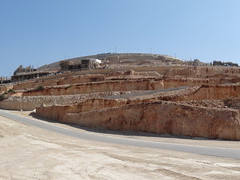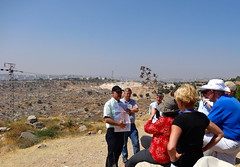- Facebook1.1K
- Total 1.1K
In writing yesterday about the Palestinian city, Rawabi, that is rising not far from Jerusalem, I thought of the Book of Nehemiah in the Bible. It tells a good and relevant story–but also a problematic one. It is a step-by-step primer in how to build a community, but also an illustration of how communities shut people out. It is about a wall–and walls can be both good and bad.
At the beginning of the chapter, the Jews are subjects of Persia; their own former capital lies in ruins. “The remnant that are left of the captivity there in the province are in great affliction and reproach: the wall of Jerusalem also is broken down, and the gates thereof are burned with fire” (1:1).
Nehemiah interprets this situation as a just punishment for the Jews’ sins. He is a Jew himself, but he has found a role as a cup-bearer or eunuch to the Persian King Artaxerxes. He recalls:
I took up the wine, and gave it unto the king. Now I had not been beforetime sad in his presence.
Wherefore the king said unto me, Why is thy countenance sad, seeing thou art not sick? this is nothing else but sorrow of heart. Then I was very sore afraid,
And said unto the king, Let the king live for ever: why should not my countenance be sad, when the city, the place of my fathers’ sepulchres, lieth waste, and the gates thereof are consumed with fire? (2:1-3)
Moved by Nehemiah’s plea, the king and queen allow and assist him to rebuild Jerusalem. Nehemiah organizes each of the clans and guilds to work on a section of the wall. The people labor for 52 days until the whole ring is complete. Much of the Book of Nehemiah records and honors the names of the builders and the sections of the wall they worked on.
While the work proceeds, divisions arise among the Jews, some of whom get rich at the expense of others. This makes Nehemiah “very angry,” and he institutes social reforms, including a ban on usury. Importantly, he personally eschews special treatment, “not eat[ing] the bread of the governor” (5:14), but working with his bare hands.
A wall benefits everyone inside it once it is whole and complete. The Jews sanctify this common good and the space it encloses. The sanctified and complete wall then becomes a framework within which individuals can construct private property. “Now the city was large and great: but the people were few therein, and the houses were not builded.” (7:4). The people come with their servants and personal property (horses, mules, camels, asses), and some give gold and silver to the city for common purposes.
The community needs not only a framework and a mix of common and collective goods, but also rules to guide the interactions of its members. So the people gather and listen to the Law as narrated by Ezra. “The ears of all the people were attentive unto the book of the law” (8:3). Finally, they celebrate a common ritual that consists of each household’s building its own small booth of “live branches, and pine branches, and myrtle branches, and palm branches” (8:15) until the whole city is a place of “mirth” (8:12) and “solemn assembly” (8:18).
All of this is exemplary of civic work:
- Nehemiah’s interactions with Persia and the local peoples are “political,” in the narrow sense of that word. He negotiates an arrangement favorable to his people. The deal may also benefit Artaxerxes by creating a loyal subject city near the frontier with Egypt. (Nehemiah’s enemies accuse him of plotting to rebel against Babylon, but he insists they are lying: “There are no such things done as thou sayest, but thou feignest them out of thine own heart.” [6:8])
- Next, Nehemiah concentrates on building an essential common resource, in this case, a wall.
- He is attentive to questions of justice within the group.
- He applies all restraints and restrictions to himself as well as others.
- He creates a space for individual initiative and freedom; but at the same time …
- He leads the people in shared rituals that reinforce their commonality.
But a wall also has another aspect. It shuts some people out even as it protects those within. The desire to distinguish between the Jews and their “heathen” enemies is a consistent theme throughout the book of Nehemiah. From the first time that the neighbors “Sanballat the Horonite, and Tobiah the servant, the Ammonite, and Geshem the Arabian, heard [about the plan to rebuild Jerusalem], they laughed us to scorn, and despised us, and said, What is this thing that ye do? will ye rebel against the king? / Then answered I them, and said unto them, The God of heaven, he will prosper us; therefore we his servants will arise and build: but ye have no portion, nor right, nor memorial, in Jerusalem” (2:19-20).
Note that Geshem is an Arab/Arabian, which makes the story particularly problematic for the case of Rawabi. Later, the same people mentioned as scoffing at Nehemiah’s project become serious about it. They “conspired all of them together to come and to fight against Jerusalem, and to hinder it. /Nevertheless we made our prayer unto our God, and set a watch against them day and night, because of them. (3:9)” Indeed, the Jews must work with spears at the ready and on 24-hour guard. They are successful, nevertheless, in finishing the wall. “And it came to pass, that when all our enemies heard thereof, and all the heathen that were about us saw these things, they were much cast down in their own eyes: for they perceived that this work was wrought of our God” (6:16).
Then, once the wall is complete and the “heathen” are shut out, Nehemiah institutes legal reforms that separate Jews from gentiles. “And the seed of Israel separated themselves from all strangers, and stood and confessed their sins, and the iniquities of their fathers.” (9:2) The people also tell a story of their own past that emphasizes their conquests. They recall that they “subduedst … the inhabitants of the land, the Canaanites” and took “their hands, with their kings, and the people of the land, that they might do with them as they would. And they took strong cities, and a fat land, and possessed houses full of all goods, wells digged, vineyards, and oliveyards, and fruit trees in abundance: so they did eat, and were filled, and became fat, and delighted themselves in thy great goodness”(9:24).
Here we see the two aspects of citizenship neatly combined. It is about building a safe and supportive common framework for a whole people–and about shutting other people out. It is about celebrating common bonds–and memorializing the enemies’ defeat.
But I would resist the idea that citizenship must always have losers as well as winners. Citizens can build bridges as well as walls, and even when they concentrate on walls, they can benefit the people who live on both sides. Although some read the poem differently, I take Robert Frost and his neighbor to be constructing a common good when they silently stack New Hampshire granite along their shared dividing line:
I let my neighbor know beyond the hill;
And on a day we meet to walk the line
And set the wall between us once again.
We keep the wall between us as we go.
To each the boulders that have fallen to each. …And he likes having thought of it so well
He says again, “Good fences make good neighbors.”

